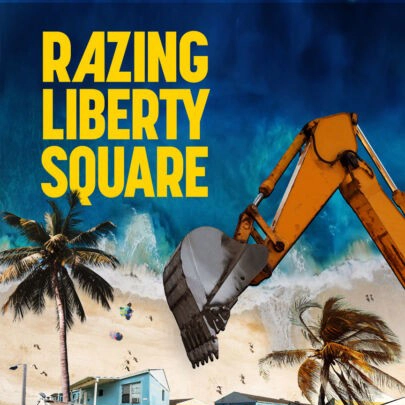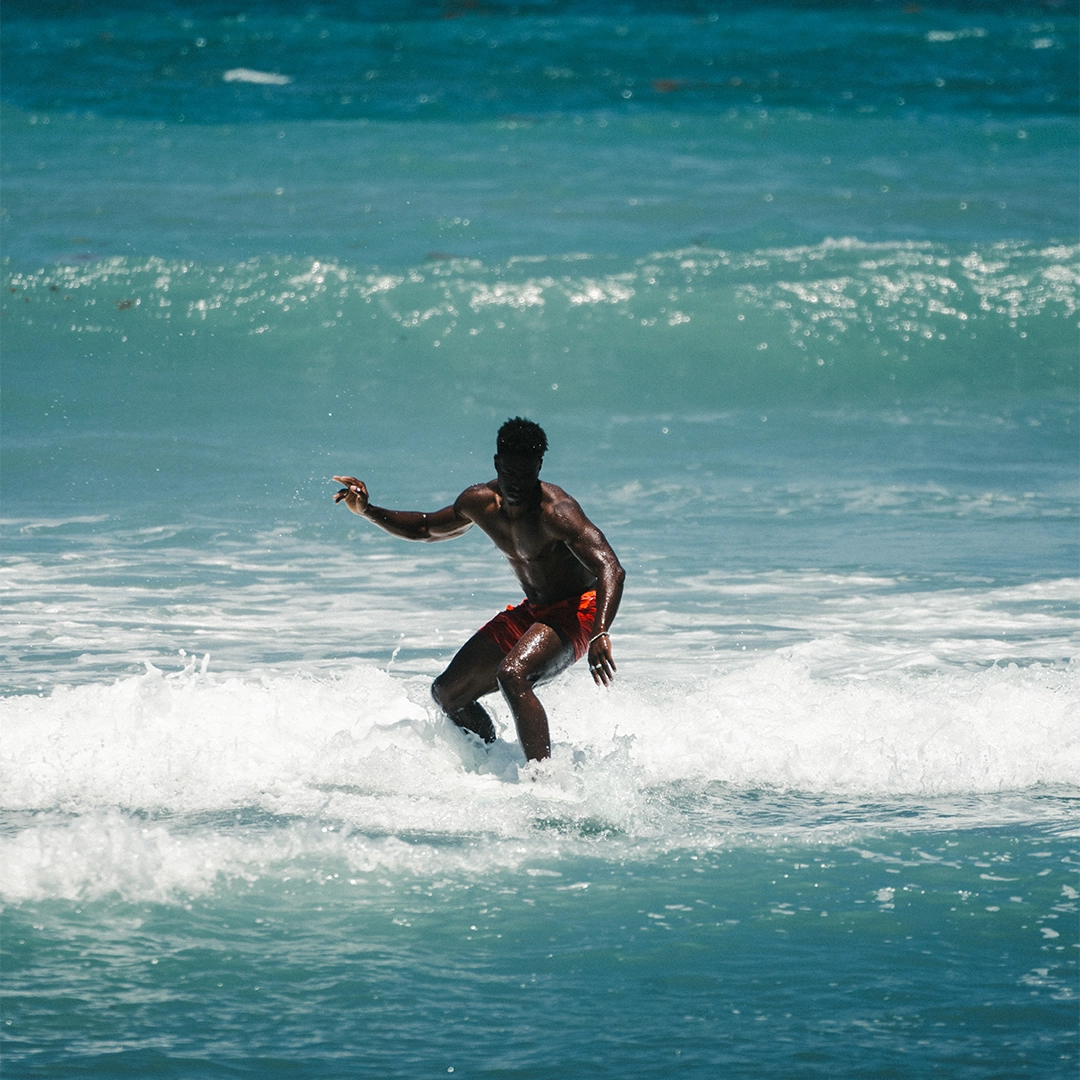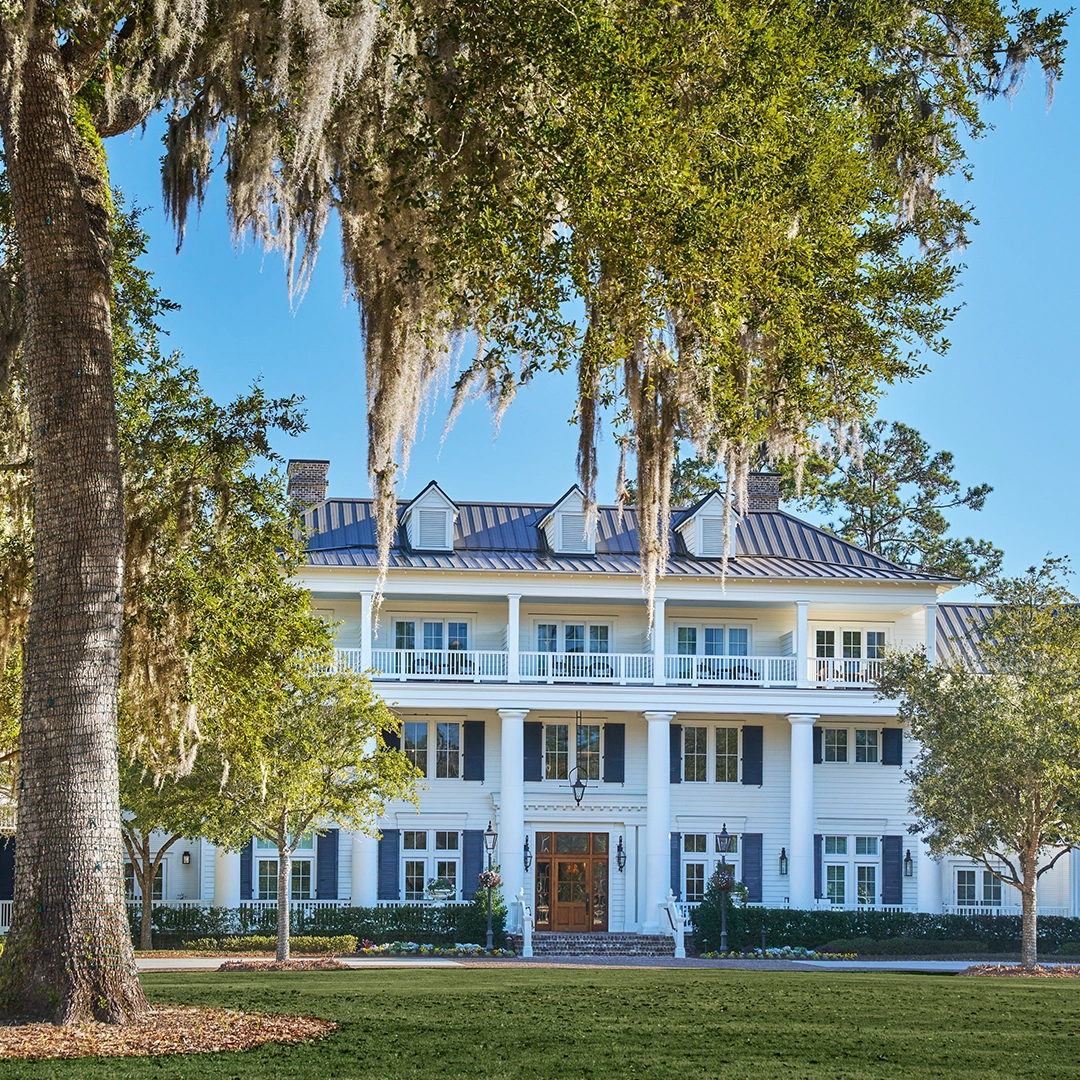In Search of Spirits in Cassadaga
A writer unlocks the truths of this mystical community, its energy healers and the supernatural.
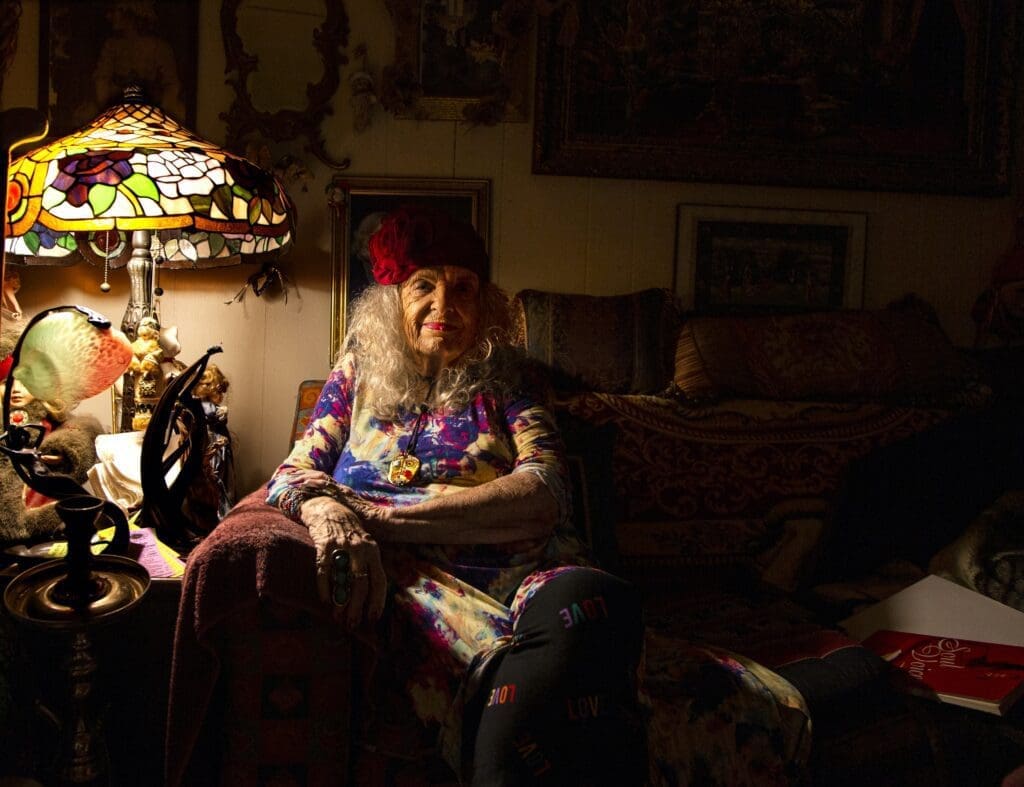
I live in the city where Tom Petty is king, but until recently, I had not paid heed to the B-side of his 1979 hit “Don’t Do Me Like That.” Petty allegedly drew inspiration for the more obscure song after reading a New York Times story about a place populated by psychics. Cassadaga lies only two hours from Petty’s hometown, Gainesville, but he had never heard of it, let alone visited, and he even misspelled its name in his lyrics. In a video clip of a live performance, Petty’s introduction is either drunken or derisive: “This is a song about this town in Florida that has 35 acres of weird people.”
Weird people.
That’s one way, a rather irreverent way, to describe Cassadaga, home to the oldest Spiritualist camp in the Southeast. It has been here since 1894, after trance medium George Colby was instructed by Seneca, his Native American spirit guide, to journey south from his home in upstate New York in search of a place “surrounded by uncommon hills” and fed by the pristine waters of lakes and springs. He traversed the Florida wilderness and found that place in Cassadaga, which he named after a Spiritualist community in New York whose members were looking for a winter home. In the Seneca language, Cassadaga means “water beneath the rocks.” So began the Southern Cassadaga Spiritualist Camp Meeting Association.
Cassadaga is, as its history suggests, a place of calm and serenity, a contrast to the dizzying assemblage of tourist attractions a few minutes away on Interstate 4. I read a story that suggested Cassadaga, not far from either Orlando or the string of beach towns that line Florida’s Atlantic coast, was emotionally worlds away.
But despite its purest intents, despite the people who settled here in hopes of establishing a Spiritualist utopia, there’s no denying that for outsiders, Cassadaga has served as somewhat of a spectacle, swirling in urban myth that has earned the town monikers like “psychic capital of the world” and “metaphysical mecca.” The bookshop sells T-shirts that say “Cassadaga: Where Mayberry meets the Twilight Zone.” Lore has it that the Hotel Cassadaga is haunted, as are many of the houses. That if you sit on the stone seat at the cemetery in nearby Lake Helen, the Devil himself will communicate with you. That birds don’t fly over Cassadaga.
Volusia County once hoped to lure droves of tourists wandering through the flatlands and pine forests of central Florida with a brochure that beckoned: “Looking for some place unusual?” Now it invites visitors to come “feel the healing energies.”
That, I suppose, reflects seismic societal shifts that ushered in an American embrace of yoga, meditation and all things considered a bit too woo-woo for generations past. A few decades ago, Cassadaga might have been that freak attraction tourists could take in between their jaunts to Disney and Daytona. It still might be that for many folks, but I have met people who take the mediums, psychics and vibe quite seriously and journey to Cassadaga to find a better way. A reputable Pew Research poll conducted two years ago found that roughly six in 10 Americans accept at least one of the New Age beliefs of reincarnation, astrology, psychics and the presence of spiritual energy in physical objects like trees—all considered oddities in the America of my youth.
I am not sure what I will make of it all. But on a balmy Saturday morning, as a tropical storm churns over warm ocean waters and threatens to dampen my weekend, I take the road toward the paranormal. Somewhere on state Route 40, I sip the last gritty remnants of my morning espresso and begin listening to Petty.
Well the clouds go by in the big blue sky
As the sun beats down on Casa Dega
I know friends and colleagues who have taken this same two-lane highway to Cassadaga. Some went in search of answers. Others wanted to commune with the dead, to be close to their deceased loved ones. My aims, I confess, are perhaps less honorable. I’m driven by the curiosity of the journalist that I am, though the question of the finality of death has burned inside me with the passing of my parents.

Spiritualism, as a religious movement, is based on a diverse set of beliefs, but it promotes an individualistic experience with God and the proposition that God is infinite intelligence. At its core is the principle of continual life—that departed souls are very much the same as they were in their physical lives and that they interact with the living to inform and guide us. The only disruption that the end of life brings for Spiritualists is the demise of the physical being, a concept that, I suppose, relieves us from grief, mourning and a fear of death.
Some tenets of Spiritualism echo the Hindu belief system in which I was raised and are not wholly unknown to me. The Bhagavad-Gita, part of the Hindu scriptures, refers to the soul as immortal, meaning that it does not die with a person’s body.
When I was still in elementary school, my brother and I often visited my grandfather’s house in north Kolkata on weekends. Built by the British, the four-story house wrapped around a courtyard, wrought-iron balcony railings gracing each floor. No one knew exactly when the house had been built, but it looked significantly older than its years, tired from the dampness of the monsoons and the neglect of renters who hardly had the means for its upkeep. It was as though the house was crying perpetually. Earthquakes had sent cracks down the walls in lightning strike patterns, and scorpions lived among the crevices. Stung by one once, my cousin was rushed to the emergency ward of a local hospital. His arm swelled and turned the purple of an evening sky.
Lore has it that the Hotel Cassadaga is haunted, as are many of the houses. That if you sit on the stone seat at the cemetery in nearby Lake Helen, the Devil himself will communicate with you. That birds don’t fly over Cassadaga.
— Moni Basu
Here, in these otherworldly rooms, my cousins and I spent lazy afternoons lying under whirring fans. We had no music or television for diversion. Instead we told spooky stories to keep ourselves entertained. And once in a while, my older cousins would lead me into the darkness of a mezzanine room between the second and third floors, where we sat in a circle on fading bamboo mats and called the spirits.
Sometimes, we practiced seances with a pencil atop a white sheet of paper and closed our eyes as one of my cousins called the names of familial ancestors. My grandfather’s father or my grandmother, who had died at a young age. In the oppressive heat of the afternoon, sweat trickled in small rivers down the landscapes of our foreheads and our backs. But we sat picture-still in pitch blackness, hoping. Hoping for the wisdom of the dead.
And the moon pulls the tide and the tide brings night
But night is more than just a night in Casa Dega…
How a religious community with ideas anathema to Christian traditions—ideas in which there is neither sin nor repentance, neither salvation nor eternal damnation to hell, and Jesus is a spiritual leader but not the son of God—had not just survived but thrived here in the heart of Florida was intriguing to me.
Donald Trump won Volusia County in 2016 with 55 percent of the vote, and his face stares at me from highway billboards, along with unborn fetuses and advertisements for gun and ammunition shops. This is conservative country, and yet a rich philosophical movement took root here—and flourished. It is a part of Florida history few really know.
It is nearly 11 in the morning when I make my final turn onto Cassadaga Road. I look upward at angry clouds threatening to burst at any moment. It doesn’t look like the weather will cooperate for the sunset orb tour, which walks visitors through energy “hot spots.” I’ve read reviews on TripAdvisor in which photographers captured the spirits as translucent light—not with their cell phones but by using a digital point-and-shoot camera. I am not sure I understand the difference.

On first sight, Cassadaga reminds me of its namesake. It’s a tiny unincorporated community of Victorian-era clapboard houses in various states of decay, much like the ones that dot the small towns long past their glory days in upstate New York. The town earned a National Register of Historic Places designation in March of 1991—the citation mentions the Mediterranean Revival style of the Cassadaga Hotel and the Colby Memorial Temple.
There is a post office but no stores here, except a few that sell crystals and other New Age accoutrements. Most people make the short drive to DeLand for food, gas and other essentials.
Bummer about the rain, I think, as I grab my bag and brolly and make my way into the hotel gift shop to check into my room. Diana Morn, clad in crimson lipstick and plastic face shield, tells me this is the busiest weekend since the coronavirus commandeered every aspect of our lives and disrupted Cassadaga just like every other tourist spot in the Sunshine State.
“Do you feel the energy today?” she asks. I smile, not knowing exactly how to reply.
Morn, 69, came to Florida on a vacation from her native Wisconsin and stayed. She had visions, she says, all her life—heard things, saw things. But no one really understood her until she planted herself here. God, she says, led her to this hotel, which she has owned since 1979.
“But this is their home,” she tells me. “We are just visitors.”
A fire burned down the original wood-frame hotel on Christmas Eve in 1925 It was rebuilt the following year. Morn tells me many of the spirits who inhabit—she doesn’t like to use the word “haunt”—the building are from that era. I look around the lobby, filled with Queen Anne tables, chairs and couches that have long lost the spring in their seats (some made by the famed Berkey & Gay).
“It’s certainly not the Hyatt Regency, but if I changed things, the spirits wouldn’t like it,” she tells me.
I wonder if this place really is filled with the spirits. What will my sleep be like tonight?
I learn that Morn was raised Catholic but if she had to own a religion today, she wouldn’t. She calls herself spiritual but is not a Spiritualist.
The hotel used to be owned by the National Association of Spiritualists but separated during the Great Depression. Therefore, Morn is not subjected to the strict rules that govern the camp. She permits psychics, tarot card readers and palmists—who are not allowed to operate within the camp—to hold sessions in the lobby or in an upstairs hotel room. It quickly becomes obvious to me that Cassadaga is divided, not just by geography but by principle. On one side of Stevens Street are the 57 acres belonging to the camp. On the other is the hotel and the metaphysical shops that are not necessarily held in high esteem by true Spiritualists.

Soon, I am greeted by Darlene McCormick, the public relations committee chairperson for the camp. She hands me an envelope filled with information about Cassadaga and tells me things I need to know. The hotel is haunted, she says, and makes sure that I know it is not a part of the camp.
McCormick, a 66-year-old Pittsburgh transplant, informs me she is studying to be certified as a medium, a process that includes 200 hours of classes and seminars and can take up to six years—she is hoping to be done by the start of next year. Only certified mediums are permitted to work within the camp. Mediumship, she says, is serious business. It isn’t something just anyone can do.
“When I was little, I knew things like when people were going to die,” she says. She followed her instincts to Cassadaga.
McCormick has already sent me an itinerary of my schedule via email; no one in the camp is allowed to speak with reporters without permission. She orients me to the place and points in the direction that I need to take for my first appointment with the Rev. Claire Van Cott. I walk down Stevens Street, past two women sitting on an inviting front porch spilling out onto a cottage garden. Purple passion flowers drape a chain-link fence. And butterflies flutter in the air, mingling with the old souls who have never left. Only Spiritualists may own homes within the camp’s boundaries, McCormick informed me; their purchase of a house must be approved by the board of trustees—sort of like in a condo building.
It’s certainly not the Hyatt Regency, but if I changed things, the spirits wouldn’t like it.
— Diana Morn
The streets here have names like Mediumship Way, Spiritualist Street and Seneca Street, which honors the Native spirit who guided George Colby to this place. Some of the buildings have historic placards, like Harmony Hall, circa 1897.
Almost every story I’ve read about Spiritualism begins in 1848 with two sisters, Maggie and Kate Fox of Hydesville, New York. They are said to have heard a strange knocking in their home that they took to be a response to the questions they asked. The Fox sisters gained fame nationwide and contributed to a rapidly growing Spiritualist movement in America. Women found a voice in Spiritualism, which allowed them to speak publicly at a time when they could not do so otherwise. Women mediums often championed ideas of women’s suffrage and equal rights for all.
Others turned to Spiritualist mediums to connect with the fathers, husbands and sons who went off to fight in the Civil War. Because their bodies never returned home, their families sought comfort in knowing that at least their souls were at peace. By the end of the war, a reported 11 million Americans subscribed to Spiritualism and 35,000 were practicing mediums, although the Spiritualist movement was not without controversy and accusations of fraud. But it survived, and today, about 200,000 Americans claim Spiritualism as their religion.

McCormick had clued me in to the difference between a psychic, an intuitive person who has the ability to read and interpret human energy, and a medium, who talks to the dead and is able to give information that has meaning. The Cassadaga camp has no psychics but advertises its mediums and healers, those who can confer God’s healing energies onto others. The camp’s website offers guidance for prospective clients. Among them:
“Try to put your mind at ease and relax before you seek a medium’s help. It creates a better atmosphere for the reading and makes it easier for spirit to make contact….Spirit provides evidence of identity in many different ways. It may be by name, description, relationships, incidents, etc…..
“Let the medium know when they are correct. Don’t attempt to confuse them…. Something may make more sense by the end of the reading, or understanding of the message may come at a later time—after you have had a chance to think about it. So don’t be quick to say ‘no’ to what is given by the medium…. Mediumship is not fortune telling.”
It may not be fortune telling, although I suspect many of the tourists who visit Cassadaga are looking exactly for that.
McCormick also told me Van Cott had recently painted her house shades of calming amethyst, that I would not miss it. At noon, I stand on the reverend’s doorstep, excited, but also with trepidation as to what I will learn. I might have been more cynical had it not been for an incident five years ago that, well, blew my mind.

It occurred at a Manhattan restaurant where I was having lunch with friends, among them the superstar mentalist Gerard Senehi, whose psychic abilities have earned him worldwide attention. As we waited for our food to arrive, Senehi was asked to show me, the skeptic, proof of his supernatural powers. He asked me to think back to my childhood, to remember a friend. I thought of someone I had not seen since the seventh grade but who was special to me back then.
“Does her first name start with an S?” Senehi asked.
“Yes,” I replied.
“Does her last name start with an R?”
Again, I replied yes.
And then he wrote out her full name. I sat there in astonishment, food spilling from my mouth. How could he know a person who has not been in my life since 1974? No one can explain Senehi’s powers. Not even he. But that day, he took away some of my doubts about supernatural powers.
That she said to me as she holds my hand
And reads the lines of a stranger
Van Cott, raised in an Irish Catholic family on Staten Island, worked for 25 years on Wall Street but sometime after the September 11 attacks, she left the city for sunny Florida. She, like Tom Petty, had never heard of Cassadaga until she moved to this part of the state. She had always known she had special powers and built a new life as a certified medium and healer. She’s no “drive-through psychic,” she makes clear; Halloween is her least favorite time in Cassadaga.
She purchased a two-story house within the confines of the Spiritualist camp that she uses as her office. She welcomes me into a converted sunroom brimming with crystal ornaments, dragonflies, butterflies, wind chimes and rose quartz. We begin the reading with the constant hum of a room air-conditioning unit struggling to keep up with the hot and heavy air outside and a timer set for 30 minutes. Van Cott, in her undeniably New York accent, instructs me to answer her questions with only “yes,” “no” or “I don’t know.”
I have come here today not knowing what I want to discover. I don’t have a quest, but I clutch a gold bangle around my left wrist, one that my mother wore to signify her marriage. Van Cott had asked me to bring an item that meant something to me. If there is anyone in the world of the departed who I feel a connection with, it is my mother.
Van Cott proceeds in a businesslike manner to cover aspects of my life. About my parents, their relationship. How she sees my mother with my grandmother on the other side. They are doing an activity together. Cooking, maybe? My mother is wearing a long skirt or something that is covering her legs. (A sari? I think.) She is sitting on a chair. Then Van Cott advises me about the frustrations in my own life.
“Are you working on a book yourself?” she asks.
“No,” I reply.
“This looks like an undeveloped thought for you….Will a book ever get published?” Van Cott asks. “Sometimes it’s more a work of love than it is for the public….It feels as if there is a story there.”
It’s true I have been thinking of writing a story based on my own life, though much of what Van Cott says is discoverable with a Google search. Still, at moments, her reading makes me stop and wonder how she might possibly have known certain things without the guidance of a higher being, whatever that may be.
“I sense there’s a level of frustration you are feeling right now,” she says. “Nobody is playing nicely.”
How true, I think. Nothing in the past few weeks has gone the way I’d planned.
I leave Van Cott’s office $70 poorer and unsure whether I am richer for it in any way. All, she says, depends on how I choose to use the information she imparted.
Yeah and she knows my name yeah, she knows my plan
In the past in the present and for the future
On my walk back to the hotel, I stop to chat with other visitors to Cassadaga. A woman whose father has just died of COVID-19. A young man who feels isolated in the pandemic. And Kristal Jones, 34, an actor in Orlando who has just returned to work after a long virus-imposed furlough. I find her sipping red wine with her friends on the hotel porch. They have come seeking emotional health and well-being.
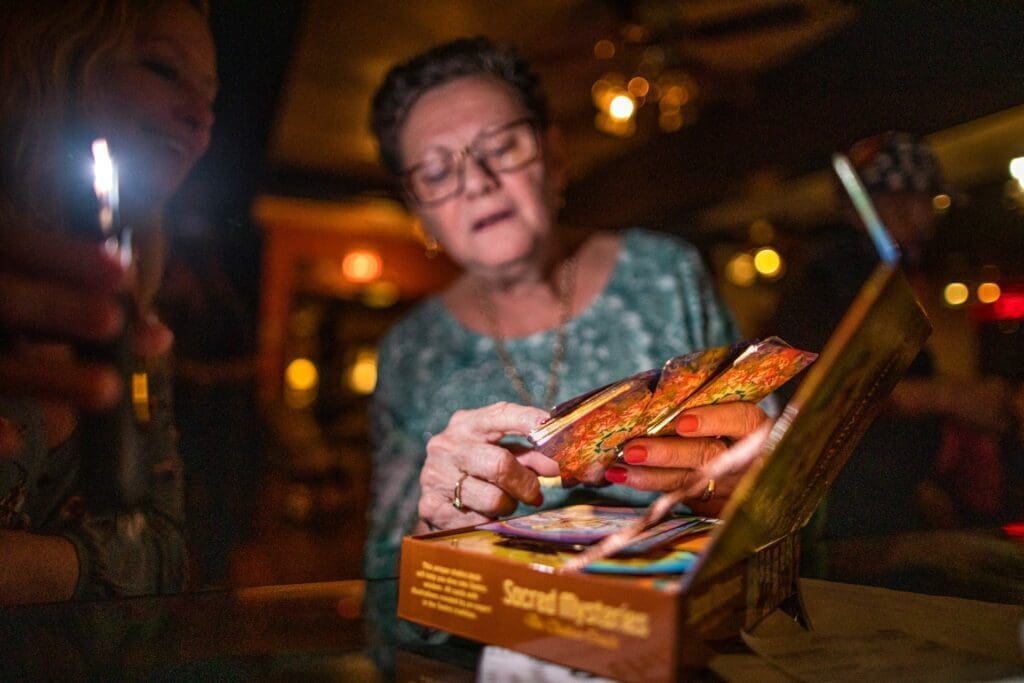
“If you’re the kind of person who is open to advice, it is certainly worth it to pony up the cash,” Jones says. “People love to learn more about themselves. And we’re going through a lot right now as a nation.”
I make time to take the historic tour of Cassadaga, but by now the rain has finally arrived, and we are forced to wear masks and socially distance inside to listen to our guide. The sunset orb tour is cancelled and instead, it seems most of Cassadaga’s visitors are jam-packed into the Sinatra’s Ristoranté at the Hotel Cassadaga for karaoke night. It’s as though the spirits will protect them from the virus.
I walk up the stairs and down a hallway lined with myriad mirrors to number 27, a sparsely decorated room with simple furnishings and a bathroom no bigger than the interior of my car. The sink, in Victorian fashion, is in the bedroom. Before I go to sleep, I peer out the door and into the hallway. Morn, the hotel owner, had assured me I would see the spirits. But all I see is the overhead light bouncing off the mirrors. All I hear is the thumping of the music from the bar downstairs. I want to stay awake and wait for the spirits. Instead, I fall into a deep sleep, oblivious to all.
The next morning, after a breakfast of bagels and smoked salmon, I make my way to the Andrew Jackson Davis Educational Building across the street for Lyceum, or Sunday school, followed by Sunday service and a Grove Service, in which certified and student mediums bring messages and insights from the dead to those in attendance. Normally Sunday services are held at the Colby Temple, but the building is undergoing major renovations.
One of the speakers today is the Rev. Donald Zanghi, a certified medium whose online bio says that “in search of metaphysical teachings, he has visited Egypt, India, Canada and Machu Pichu, Peru.” He grew up a Catholic (almost everyone I have met so far in Cassadaga is a Northerner raised in the Catholic Church) and begins his comments today with the fear of death that was instilled in him at a young age. The extent of his religious training, he says, was heaven or hell.
“And so, I would wake up sobbing,” he tells the small gathering of 20 people.

He says he no longer worries about dying, even though death is never far. His wife, Jeanette Strack-Zanghi, is 23 years older than he. I had met her the day before during a short visit to the couple’s home, just down the street from Horseshoe Park and the Fairy Trail. She, like Van Cott, had never planned to settle here. She had heard the stories of satanism and thought witches made their home in Cassadaga.
“I was scared to come here,” she told me, as I settled on a chair in a sitting room filled with dolls, embroidered cushions, statuettes, opera masks and more dolls. Hardly an inch of space in the Zanghi household is left to spare. Marie Kondo would have a field day.
In her youth, Strack-Zanghi was as striking as a model and even now she is a spry nonagenarian, impeccably dressed in a black-and-white printed tunic and pants, a black flower headband wrapped around a shock of white hair. She has been a journalist, a teacher, an insurance saleswoman. She married twice and had some challenging relationships. At one time, her life had been tumultuous, so much so that she remains estranged from one of her sons. She met Zanghi after she came to Cassadaga. In one of her many books, she recounts how the two discovered they had known each other in a past life and that they were meant to be soulmates.
“I live with death every day because of my age and my illnesses. It is my partner,” she said. “Every morning I wake up and think, ‘I’m still here.’”
God, she said, is in every breath she takes and God will be in her very last. I asked her if, at 94, she spends her days contemplating her mortality. She assured me she won’t be alone when death comes.

“I don’t have a fear, no,” she said. And then she laughed. “I just hope I am forgiven for the middle part of my life.”
Her words stay with me as Sunday services come to an end and it is time for me to head home. Ever since my parents died two decades ago, I have thought much about what happens to us after life ends. I’d like to believe my mother is with me always, that her soul is immortal. I’d like to believe that Rev. Van Cott, the medium who did my reading, really did feel my mother’s energy.
Yes, I’d like to believe.
The rain has finally stopped. I know now there is no Devil’s Chair in Cassadaga, not even a cemetery. I look up at the blue sky to see a bird flying overhead. A crow, most likely. Then I begin my drive back to the hometown of Tom Petty, the B-side of his 1979 hit blasting through the car speakers.
Oh, baby now, I think I’m starting to believe the things that I’ve heard.
’Cause tonight in Casa Dega, I hang on every word.
MONI BASU is a veteran journalist and former reporter at CNN and the Atlanta Journal-Constitution. She now teaches advanced writing at the University of Florida and is also a distinguished professor of practice in the University of Georgia’s MFA program. Basu covered the Iraq war from its inception and published an e-book, Chaplain Turner’s War (2012, Agate Publishing), about an Army chaplain at war. Born in India, Basu grew up straddling two cultures and her work often explores the complexities of race, ethnicity and identity. You can read her last story for Flamingo about Florida veterans finding friendship and support on the open seas here.

